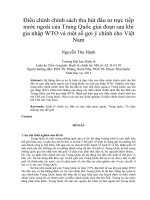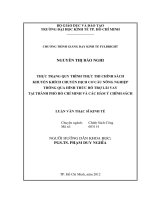Ý CHÍNH CÁC BÀI LUẬN THI VSTEP
Bạn đang xem bản rút gọn của tài liệu. Xem và tải ngay bản đầy đủ của tài liệu tại đây (188.03 KB, 22 trang )
WASTE / GARBAGE / LANDFILLS
I. CAUSE
1. One of the most important reasons is our consumer and materialistic culture.
2. Product are not made to last.
3. As the price have decreased thank to mass production, if something break, we throw it away
and buy a new one.
4. Advertisers are also to blame:
We are persuaded to follow the latest trend. Clothes which have been worn only a few times
and gadgets that are still perfectly usable are discarded because of what the fashion dictates.
They create demand for things we do not need.
5. Most foodstuff is sold in non-biodegradable packaging.
6. People do not recycle.
7. When population rises, the demand for manufactured products grows, which is turn increase
waste.
II. SOLUTIONS
1. Companies should make goods that last longer.
2. They should not use so much packaging or at least use biodegradable kinds.
3. We should not be brainwashed by advertisers and buy what we do not need.
4. Household should separate waste so that a part of it could be recycled.
5. More collection banks for glass, paper, and plastic bottles need to be established.
6. People need to be educated and informed about the advantages of recycling and the threats of
having countless landfills.
7. Consumers need to avoid purchasing over - packaged products.
8. We should reconsider our consumption habits and only buy what we think is necessary and
useful.
III. EFFECTS OF LANDFILLS
1. Methane gas is produced during the process of organic matter decay. It is 20 times more
effective than carbon dioxide in trapping solar radiation and causing global warming.
2. Landfills seriously impact air quality in their vicinity.
3. A huge percentage of landfill toxins infiltrate the soil, reach waterways, and eventually end
up in the domestic water and the foods that we consumer, causing many diseases.
4. Landfills render the soil and land where they are located unusable. It also destroy the adjacent
soil because the toxic chemicals spread into the surrounding soil, upsetting the land ecosystems.
5. Landfills gases, together with a substantial amount of landfill waste, can easily start a fire.
GOLBAL WARMING
What do you know about global warming?
I. CAUSES
1. Humans are increasing greenhouse gases such as carbon dioxide in the atmosphere.
Factories burn fossil fuels and emit greenhouse gases.
The number of vehicles has increased and most vehicles give off exhaust fumes.
Many developing countries do not care about the environment. They just want to be
industrialized.
Many people do not buy local products. Needless to say transportation means burning fuel.
→ These gases allow the atmosphere to trap too much heat from the sun. This is called the
greenhouse effect, which cause global warming.
II. EFFECTS
1. Global warming presents the greatest threat to our environment.
2. It has been reported that by the year 2100 the average temperature is likely to have increased
by 1.4 to 5.8 degrees.
3. Global warming is a serious threat to animal and plant life as it is changing their habitat.
4. It is likely to impact ecosystems, agriculture and the spread of disease.
5. Global warming will melt the polar icecap.
6. The melting of Greenland icecap alone would raise sea levels by seven meters. Such a rise
would submerge many islands, making them uninhabitable. This would affect hundreds of
millions of people.
7. A number of nations and cultures that have existed for thousand of years are going to be
destroyed.
8. There will be more extreme weather conditions such as typhoons and hurricanes.
III. SOLUTIONS
1. We should try to develop alternative, renewable sources of energy like solar and wind.
2. Governments could introduce stricter rules and force factories to reduce their emission.
3. Using public transportation, cycling and going to work on foot rather than driving could help
mitigate global warming.
4. Driving hybrid cars and trying to buy local products are among the most viable solutions.
NUCLEAR ENERGY
Should we continue to use nuclear energy?
I. YES
1. If we continue to use fossil fuels, we will use them all up. There is not enough oil, coal, and
gas to meet the future demand.
2. Unlike wind and solar energy, which rely on weather patterns, nuclear energy has no such
limitation and available regardless of the weather conditions.
3. It is environmentally-friendly, (e.g. it emits small amount of greenhouse gases, so it does not
contribute to global warming.
4. Nuclear energy is a huge industry and has brought employment to many towns and cities.
5. Nuclear energy is sustainable and could be used without wasting natural resources.
6. It is cost-effective.
Compared to other types of power plants, nuclear power plants, nuclear power stations have
lower operation and maintenance costs.
Nuclear reactor can also last up to 60 years, which means there is no need to build a new
reactor every now and then.
Uranium, which is used as a fuel during the process, is not costly.
7. Uranium, which is the main element in the process of nuclear fission, is abundant.
II. NO
1. Nuclear energy is not safe:
When there is a nuclear accident, the impact is catastrophic (e.g: thousands of people will be
affected).
There are very high levels of different kinds of cancer among people who live near nuclear
power plants.
Radioactive waste can pose a threat to our health.
2. We should focus on greener energy sources like solar, wind and hydroelectric power.
3. Unlike solar energy, it cannot last forever because uranium, although abundant, is finite.
4. There is a chance terrorists could steal radioactive materials.
5. Compared to other power plants, building nuclear power stations requires a large amount of
money.
6. Constructing them also requires a large amount of time, which means it takes years before a
new plant can become operational.
7. It is harmful to the environment.
FAT AND HAPPY
Should we all grow fat and happy?
I. YES
1. We only live once; let’s enjoy ourselves.
2. We should not care about what other people think of us.
3. Exercise is a kind of torture, why should we exhaust ourselves like that?
4. Dieters are always miserable as they are constantly hungry.
5. Why should we spend a lifetime fighting a losing battle against spreading hips.
II. NO
1. It is myth that all fat people are happy.
2. Fat people suffer psychologically and physically:
Obesity makes fat people objects of ridicule so they become miserable at school and as
grown-ups.
Being overweight is bad for health (e.g: it leads to heart diseases, high blood pressure,
diabetes,…)
3. Ready-made clothes and hard to obtain for fat people.
4. Fat people tire easily.
5. Being fat is associated with insensible living.
6. Premature death is more likely in fat people.
7. Life quality is poor for fat people. A life of gasping and wheezing and sitting in doctors’
waiting rooms is not a quality existence.
8. Most heavy people suffer from chronic back pain.
9. They might develop depression because of the stress caused by having out-of-balance body
chemistry, feeling unattractive, being socially isolated, not finding a spouse,…
10. Seats in planes, theaters and cars are tight for fat people.
11. Making and keeping friends is tough. As superficial as it may be, people tend to befriend
folks that they are pleased to introduce to their other friends.
12. Many employers refuse to hire anyone who is overweight because they believe fat people
work too slowly and tire before the workday ends.
HEALTH
How can we enjoy good health?
I. DIET
1. It is absolutely essential not to eat junk food:
French fries and other junk foods can be addictive, once you start eating them, you want to
eat them more and more often.
These foods contain too much fat, salt and sugar.
Eating too much junk food makes people overweight.
It also leads to high blood pressure, diabetes, and heart disease.
Junk food can cause bad behavior and learning difficulties in children.
Junk food lacks minerals and vitamins, which are essential to health and growth.
Since there foods contains high amounts of cholesterol, they could trigger heart attacks and
strokes.
2. We should act on dietitians’ advice and eat at least two serving of fruit and three of
vegetables every day.
3. We should eat organic food rather than genetically modified food,
4. We need to eat sufficient quantities of different food stuff, having a well-balanced diet is
extremely important.
5. The human body requires a balanced diet.
6. An unhealthy diet can cause various health problems.
7. Obesity, diabetes and heart disease are on the increase.
8. Many people nowadays rely on fast food or pre - prepared meals.
9. These foods often contain too much fat, salt and sugar.
10. They are cheap to buy and very easy to prepare.
11. Many young people have grown up on a diet of convenience foods.
12. Populations in developed countries are increasingly overweight.
II. EXERCISE
1. Exercise can reduce the risk of various types of cancer.
2. Exercise can lower the risk of types 2 diabetes.
3. Exercise can mitigate this risk of heart disease.
4. Exercise can minimize the risk of high blood pressure.
5. Exercise burns calories and helps strengthen bones and muscles.
6. Most people nowadays lead a sedentary lifestyle:
We tend to walk less and do desk jobs.
Most adults relax by watching television.
Children play video games instead of doing sports.
7. It could control your weight.
8. It improves your mental health and mood.
9. It increases your chances of living longer.
10. Regular exercise is essential in maintaining a healthy body.
11. Exercise burns calories and helps to build healthy bones and muscles.
12. Doctors advise exercising at least three times a week for 20 minutes.
13. Most people nowadays lead a sedentary lifestyle.
14. We tend to walk less and do desk jobs.
15. Most adults relax by watching television.
16. Children play video games rather than doing outdoor sports.
17. In the past, people were more active in their jobs and at home.
III. GOVERNMENT’S ROLE
1. Governments have a significant role to play in reducing obesity.
2. More and more people, including young children are seriously overweight.
3. They are at risk of heart disease and diabetes.
4. This situation will increase the burden on hospitals and taxpayers.
5. Hospitals rely on the government for money and resources.
6. Governments should promote a healthy diet and regular exercise.
7. There should be more time for sports on school timetables.
8. Unhealthy junk food should be banned from school menus.
9. People need information about what foods contain.
10. Food packaging must show the food’s nutritional content.
11. The government should recommend eating five portions of fruit and vegetables per day.
12. This money could be spent on schools, hospitals and other public services.
CELL PHONES / SMARTPHONES
Do they have more advantages than disadvantages?
I. YES
1. Cell phones are useful in emergencies. They could even save your life due to allowing you to
contact the police, fire-department and so on.
2. They keep you from getting bored. For example, you can read the news, play games, listen to
music or watch movie, while on a bus.
3. They have revolutionized the way we communicate.
4. We can stay in touch with family, friends, and colleagues wherever we are = keep in touch with.
5. Smart phones are versatile: they allow us to send text messages, surf the internet, take photos,
listen to music,…
6. They could be used as fashion accessories.
7. They are powerful learning tool. Because of the applications put in smart phones these days,
children and eve adults will learn a lot of things from them.
8. They are equipped with high-resolution cameras. With these devices, you always have your
camera available, being able to take high-quality photos any time you want.
9. Having a smartphone makes it much more convenient yo check your email or even your bank
account while on the go.
10. Smartphones can be great for divers as they can help them get to their destination and avoid
traffic jams.
II. NO
1. It is so annoying when people talk loudly on their cell phones.
2. People have become too dependent on them. We are addicted to our mobile phones and the idea
of leaving them at home or turning them off would give us instant anxiety.
3. Cell phones reduce face-too-face communication.
4. Some people send reduce text messages.
5. Cell phones could be problematic in some public places:
They cause disturbance in cinemas.
They could disrupt classes and break students’ concentration.
6. Their waves could damage our brains.
7. They are a popular target for thieves.
8. They could be a dangerous distraction ( e.g: using cell phone while driving reduces the diver’s
concentration). Texting while driving has already caused tens of millions of deaths from traffic
accidents.
JOB HOPPING
Do you think switching jobs frequently is a good idea?
I. YES
1. It will surely help you learn new words skills. It widens your skill set and adds to your knowledge
of various fields.
2. Any job is accompanied with a set routine, which is bound to make you bored sooner or later.
Changing your job, thus, serves as a good break and will keep you enthusiastic about life and work.
3. As you change jobs, you will meet new people, and this will add to your contacts in various
industries.
4. Through working in different fields, you could find the field that is best for you and you are truly
interested in,
5. It is difficult to keep your skills sharp when you deal with the same group of people for an
extended period of time.
6. Working up to higher pay and benefits within a company can take many years, while switching
jobs can allow workers to get significant increases in pay, benefits and responsibilities quickly.
7. Changing jobs lets workers escape dead - end job continue to learn and grow.
8. In some cases, frequent job changes can indicate great adaptability.
II. NO
1. It affects trust and confidence. Very often, employers are wary of hiring employees who have a
record of frequent job changes in their resume. This is because they believe they cannot be trusted
in the long run.
2. It adversely influences your image. Negative qualities like lack of commitment and immaturity
are associated with a person who changes their jobs frequently.
3. Job hoppers generally lack in - depth knowledge. A person gains comprehensive knowledge of a
subject only after they work on it for a certain duration of time.
4. A person with a history of too many job changes often comes across as someone who lacks
expertise. People believe they just know a little about many things. Jack of all trades, master of none.
5. Those who stay with a single company are able to rise in seniority while job hoppers have to
compete for a stronger role at each new company they go to.
6. The longer you stay at a position, the easier it becomes. You learn the ropes and how to “ recycle
“ your knowledge. This means you could have free time to work on personal projects go back to
school or work toward another goal.
WORK
I. THE BENEFITS OF STAYING IN THE SAME JOB FOR LIFE.
1. Employees have a stable career with one employer.
2. They have a good pension and health insurance.
3. Their salaries gradually increase.
4. They may be promoted within the organization.
5. They demonstrate loyalty.
6. Experienced staff can be trusted with more responsibility.
7. They become part of a team.
8. There is a clearly-defined path for development.
II. THE BENEFITS OF NOT STAYING IN THE SAME JOB.
1. People often change jobs in order to further their career.
2. Another company may offers a promotion or a higher salary.
3. People who change jobs can gain more experience.
4. They can learn different skills.
5. Changing jobs is interesting and challenging.
6. People can retain in a different occupation.
7. In a fast - changing world, workers need to be flexible.
8. People need to develop a wider range of experience and skills.
III. SELF- EMPLOYMEMT
1. Nowadays, it is easy to set up a company.
2. The internet provides a global marketplace.
3. Self-employment offers greater freedom than working for a company.
4. However, there are risks to starting a new business.
5. Self- employed people may face financial difficulties.
6. Many businesses fail to make a profit.
7. There is less stability in self - employment.
8. There are no benefits like pensions, sick pay and holiday pay.
9. Self - employment involves hard work, long hours and total responsibility.
IV. UNEMPLOYMENT
1. Unemployment is a big problem for individuals, communities and the society.
TRANSPORT
I. TRAFFIC PROBLEMS
1. Traffic congestion is caused by commuters travelling to work.
2. Most people live in the suburbs outside city center.
3. Commuters tend to travel at the same time of day.
4. They tend to travel alone.
5. Cars and road space are not used efficiently.
6. This causes traffic jams during the rush hour.
II. TRAFFIC SOLUTIONS
1. In order to reduce traffic we should change our working habits.
2. The internet can now be used to connect people.
3. More people could work form home.
4. Meetings can be held as video conferences.
5. Workers could be given flexible timetables.
6. Another solutions would be to tax drivers.
7. Workers should share their cars and travel together
8. In London, for example, there is a congestion charge.
9. This help to raise money for better public transport.
10. Public transport needs to be reliable and efficient.
III. POSITIVES OF PUBLIC TRANSPORT
1. We need to reduce our dependence on cars.
2. Parking a car can be extremely difficult in big cities.
3. Well - designed transport systems are comfortable and convenient.
4. Modern public can help to reduce pollution in cities.
5. Investment in buses and trains will ease traffic congestion.
6. Buses can be given special lanes to avoid traffic.
IV. NEGATIVES OF PUBLIC TRANSPORT
1. Public transport if often slow and unreliable.
2. Metro systems and trains are often dirty and crowded.
3. People feel like sardines in a can.
4. Cars are much more comfortable.
V. ROAD SAFETY
TOURISM
I. POSITIVES OF TOURISM
1. Tourism is a popular leisure activity.
2. People go on holiday to relax and have fun.
3. Tourists can experience different cultures.
4. They can sunbathe on breaches or go sight - seeing.
5. Travelling abroad opens our minds and broadens our horizon.
6. We can learn to speak other languages.
7. The tourist trade is vital for some economies.
8. It creates employment in services like accommodation, transport and entertainment.
9. Some areas rely on tourism for their income.
10. Tourists spend money.
11. Tourism attracts investment from multi-national companies.
12. It helps to improve the standard of living.
13. Low-cost airlines are making it cheaper to travel abroad.
II. NEGATIVE EFFECTS OF TOURISM
1. Tourism can have a negative effect on the natural environment.
2. The building of facilities and infrastructure can destroy the habitat of wild animals.
3. Beautiful beaches are spoilt by the building of hotels.
4. Tourism creates pollution and waste.
5. It puts pressure on local resources.
6. Local traditional and cultures may be endangered.
7. A rise in the cost of living affects local people.
8. The price of goods, services and housing may increase significantly.
III. THE FUTURE OF TOURISM
1. Government should introduce laws to project natural environment and local cultures.
2. Tourism should have a low impact on wildlife.
3. Renewable resources like solar or water power should be used.
4. Waste should be recycled.
5. Local businesses such as farms should be supported.
TELEVISION, INTERNET, PHONES
I. POSITIVES OF TELEVISION
1. Watching television is a good way to relax.
2. It is many people’s favorite way to wind down after a hard day at work.
3. Television programs can be entertaining and enjoyable.
4. Viewers have access to a huge variety of entertainment channels.
5. Television brings the best comedians, musicians and actors into our homes.
6. TV programs can also be informative and educational.
7. News coverage makes the public aware of events around the world.
8. Documentaries can make learning more interesting.
II. NEGATIVES OF TELEVISION
1. Television is having a negative impact on society.
2. Some people link violence on television with crime rates in the real world.
3. Children are less healthy because they spend less time playing.
4. Children copy the behavior they see on the screen.
5. Advertisers direct their marketing at children.
6. Watching TV is a waste of time.
III. OPINIONS ABOUT TELEVISION
1. Television has many benefits.
2. However, it can be addictive.
3. Children should play outside rather than sit in front of a screen all day.
4. Behavior shown on TV can influence people.
5. Parents should choose carefully what their children watch.
6. Children should no be exposed to violence, swearing or sexual images.
7. Advertising during children’s programs should be strictly controlled.
8. TV companies should make more positive, educational programs.
IV. POSITIVES OF THE INTERNET
1. There are many advantages to using the Internet.
2. It gives up instant access to information on almost any subject.
3. Shops and other services from comfort of their homes.
4. The Internet is starting to replace other forms of entertainment.
5. It has revolutionized communication.
SPORT AND LEISURE
I. ARGUMENTS AGAINST PROFESSIONAL OR COMPETITIVE SPORT
1. Sport has become a business.
2. Professional sport encourages people to compete for money.
3. Many sports stars are only concerned about money and fame.
4. Some athletes take drugs in order to win at any cost.
5. Competitors are often selfish and rude.
6. They are not good role models for children.
7. All sport should be amateur.
8. Sports should be leisure activities rather than jobs.
9. People should do sporting activities for enjoyment and health reasons.
10. Taking part is more important than wining.
II. ARGUMETS FOR PROFESSIONAL SPORT
1. Professional sports are the same as any other business.
2. Many people are employed in the sports industry.
3. People should be able to use their talents to earn a salary.
4. Money is necessary to improve facilities and train athletes.
5. Sports stars entertain millions of people.
6. The level of professional sport is much higher than that of amateur sports.
III. ARGUMENTS FOR COMPETITIVE SPORT.
1. Competitor is a natural instinct in humans.
2. In daily life we compete to get jobs or the highest grades.
3. Sports are a safe form of competition.
4. Competition is healthy because it pushes us to give our best.
5. Competitors and fans ca release energy and aggression.
6. Supporters of teams feel a sense of belonging to a community.
IV. OPINION: PROFRSSIONAL SPORT SALARIES ARE TOO HIGH
1. Sports professionals earn too much money.
2. They do not provide a vital service.
3. Football players, for example, earn enormous salaries by simply kicking a ball.
4. We could all five happily without professional football.
5. Life would be difficult without doctors, engineers and other vital professionals.
LANGUAGE
I. ENGLISH AS AN INTERNATIONAL LANGUAGE
1. English is widely used around the world.
2. It is becoming a global second language.
3. It is the dominant language of technology, science and international business.
4. International business meetings are regularly held in English.
5. The most important textbooks and journals are published in English.
6. The ability to speak English is necessary skills in the modern world.
II. NEGATIVE OF ENGLISH AS AN INTERNATIONAL LANGUAGE
1. If one language is dominant, other languages many disappear.
2. The dominant language brings it own culture.
3. American culture has become popular around the world.
4. Other cultures may be damaged.
5. As an alternative to English, a new global language could be invented.
6. It would have no nationality or culture attached to it.
7. This could help to promote international peace and understanding.
8. Esperanto is an example of a language that was invented with this aim.
ANIMAL RIGHTS
I. ARGUMENTS FOR ANIMAL TESTING
1. Animals are used in important scientific research.
2. It is necessary to do medical tests on new drugs.
3. Animal testing helps to advance medical and scientific knowledge/ medical breakthroughs.
II. NEGATIVE OF ZOOS
1. Zoo animals are kept in artificial environments.
2. They are kept in cages or have limited space.
3. Zoo animals rely on humans.
4. They lose the freedom to hunt for food.
5. They best way to save endangered species is by protecting natural habitats.
6. Some people believe that zoos are unethical.
7. Zoos exhibits animals with the aim of making money.
8. We have no right to use animal for entertainment.
HOUSING AND ARCHITRCTURE
I. STATE OR COUNCIL HOUSING
1. In some countries the government provides state or council housing.
2. This helps people who cannot afford to buy their own house.
3. It can be argued that state housing creates dependence on the government.
4. People should rely on the government to look after them.
5. People have no incentive to earn money and buy their own home.
6. Council properties are often made with cheap, poor-quality materials.
II. OLD BUILDINGS
1. Historic building are part of a country’s heritage.
2. They should be protected.
3. Old building are often considered to be works of art.
4. They give character to cities and attract tourists.
5. They show us how people lived in the past.
6. We identify countries by architectural symbols like the pyramids in Egypt.
7. Governments should spend money on looking after historic buildings.
8. They need regular repairs and maintenance.
9. New buildings should be designed to complement them.
III. MODERN OR GREEN BUILDING
1. Modern buildings should be designed to be environmentally friendly.
2. They should use less energy and produce less waste.
3. Modern insulation e water, sound and heat covering can make houses more energy efficient.
4. Solar and wind power can be used to generate electricity.
5. Rainwater and waste water can be recycled and used to flush.
6. Modern glass building take advantage of natural light.
GOVERNMENT AND SOCIETY
I. WHAT GOVERNMENTS CAN DO
1. Governments provide public services like healthcare and education.
2. They support people who are living in poverty or unable to work.
3. Governments raise money by taxing working people.
4. They can spend money on resources and campaigns.
5. They can introduce new laws.
6. They can improve taxes.
7. They can raise people’s awareness of issues ( e.g: climate change/ healthy eating )
8. They can influence people’s habits and opinions.
9. They can create jobs/ more job opportunities.
10. They can regulate the activities of companies such as banks.
11. They can provide resources for schools.’
12. They are also responsible for the security and well-being of their citizens.
13. They control armed forces and police forces.
II. PUBLIC SERVICE
1. Governments pay the salaries of public sector workers like police offices and teachers.
2. The necessary money is raised by taxing people’s income.
3. Free education and healthcare may be provided by the state.
4. Some governments control public transport systems and even TV channels.
5. Some people believe that competition between private companies is good.
6. It helps to improve quality while bringing prices down.
7. Other people think that essential services should be free.
8. Governments should pay for them.
III. CEBSORSHIP OPINION
1. Governments can censor what public sees or reads in the media.
2. To a certain extent censorship is necessary.
3. We should use censorship to protect children from violent images.
4. Some computer game involve killing people or committing crimes.
5. The Internet also needs to be controlled.
6. Support teacher can be employed to help children with learning difficulties.
GLOBAL ISSUES
I. PROBLEMS IN DEVELOPING COUNTRIES
1. Developing countries face a range if problems.
2. Standards of healthcare and education are low.
3. Life expectancy in these countries is usually lower than developed countries.
4. There is lack of infrastructure, employment and good quality housing.
5. Many people are forced to live in poverty.
6. Food, drinking water and basic medicines are in short supply.
II. HOW TO HELP DEVELOPING COUNTRIES
1. The best form of help for developing countries is development aid.
2. Richer nations can help by investing in long-term projects.
3. Governments and charities can help by building new houses and schools.
4. Globalization may also help developing countries.
5. Multi-national companies can create jobs in developing countries.
6. On the other hand, many people emigrate to find work in richer countries.
7. They often send money back home to their families.
8. This money helps to improve the standard of living in developing countries.
III. IMMIGRATION
1. Some people move to other countries in search of a better life.
2. Many immigrants come form less developed countries.
3. Richer, industrialized countries may offer opportunities for employment.
4. Free healthcare and schooling are available in some developed countries.
5. Other people migrate to a foreign country to improve their academic qualifications.
IV. POSITIVES OF IMMIGRATIONS AND MULTI-CULTURE SOCIETIES
1. From an economic perspective, immigration can be extremely positive.
2. Many immigrants have skills that are needed in the country they move to.
3. Immigrants who find work contribute to the economy of their new country.
4. Many immigrants send money home to help family members.
5. Employees cannot be confident that they have stable jobs.
6. Companies sometimes exploits their employees in developing countries.
7. Global trade creates more waste and pollution.
V. THE FUTURE OF GLOBALIZATION
1. There should be global regulations for salaries and working conditions.
2. Governments should impose laws to protect the environment.
GENETIC ENGINEERING
I. POSITIVE OF GENETIC ENGINEERING
1. Genetic engineering is the practice of manipulating the genes of an organism.
2. It is used to produce crops that are more resistant to insects and diseases.
3. Some genetically modified crops grow more quickly.
4. Some drugs and vaccines are produces by genetic engineering.
5. It may become possible to change human’s genetic characteristics.
6. Scientists may use genetic engineering to cure.
7. Inherited illnesses would no longer exist.
8. Genes could be changed before a baby is born.
9. It could also be possible to clone human organs.
10. We could all have replacement body part.
11. Humans could live longer, healthier lives.
II. NEGATIVES OF GENETIC ENGINEERING
1. There are ethical concerns about humans genetic engineering.
2. Parents might want to choose their children’s characteristics.
3. This would be unnatural.
4. It would be unacceptable in most religions.
5. Soldiers could be cloned from the genes of the strongest people.
6. Clones might be used like robots to do certain jobs.
7. Clones might even be developed just for organ replacement.
8. Society and human evolution would change completely.
9. Currently, human genetic engineering is prohibited.
III. CARE FOR OLD PEOPLE: OPINION
1. The best form of care for the elderly depends on the family situation
2. It depends on whether family members have the time resources.
3. We all have a responsibility toward the order people om our society.
4. Governments should invest money in facilities and training for care workers or social service
workers.
ENVIRONMENT
I. GLOBAL WARMING
1. Gases such as carbon dioxide trap heat from the sun.
2. This causes global temperatures to rise.
3. This process is known as the greenhouse effects.
4. Human activity is a major factor in the rise of the greenhouse gases.
5. Factories and vehicles produce emissions and exhaust fumes.
6. Many developing countries are becoming industrialized.
7. The number of cars on our streets is growing.
8. Cheap air travel is allowing more people to fly.
II. EFFECTS OF GLOBAL WARMING
1. Global warming will have a significant impact on our planet.
2. Rising temperature will cause melting of the polar ice caps.
3. Sea levels will rise.
4. We can expect more extreme weather conditions.
5. Flooding and droughts may become more common.
III. IMPACTS OF HUMANS ON THE ENVIRONMENT
1. The increasing world populations is putting pressure on natural resources.
2. Fossil fuels like oil and gas are running out.
3. We are destroying wildlife habitats.
4. We have cut down enormous areas of rainforest.
5. This has lead to the extinction of many species of animals and plants.
IV. SOLUTIONS TO ENVIRONMENT PROBLEMS
1. Governments could introduce laws to limit emissions from factories.
2. They should invest in renewable energy from solar, wind or waters power.
3. They could impose green taxes on drivers and airlines companies.
4. Streaming could damage students’ self esteem.
5. They may lose motivation.
6. Students from wealthier families tend to be better prepared.
7. Children from poorer families may receive less support from parents.
8. Mixed ability classes encourage everyone to achieve their.
CRIME
I. POLICE AN CRIME PREVENTION
1. The job of the polices is to catch criminals.
2. They must also prevent crime and make communities safer.
3. There should be an increase in the number of police officers on the streets.
4. Police officers should be seen as part of the community.
5. They should be involved with education and prevention.
6. The police should be in close contract with schools.
7. They should focus on young people who have dropped out of schools.
8. They should focus on young people who have dropped out of school.
9. These teenager may become involved with gangs.
II. PUNISHMENTS/PRISONS
1. Fines are used as punishment for minor crimes.
2. If the crime is more serious, prison is the most common punishment.
3. Some criminals pose a threat to society.
4. They are put in prison to ensure the safety of other citizens.
III. NEGATIVES OF PRISONS
1. Criminals are put together.
2. They make friends with other offenders.
3. Many prisoners re-offend when they are released.
4. A criminal record makes finding a job more difficult.
IV. REHABILITATION
1. Another aim of prisons is rehabilitation
2. Prisoners receive education of vocational training.
3. Prisoners should learn personal skills and specific job skills.
4. Punishment could make prisoners’ behavior worse.
5. Rehabilitation aims to make them better citizens.
6. Rehabilitated prisoners are less likely to re-offend.









